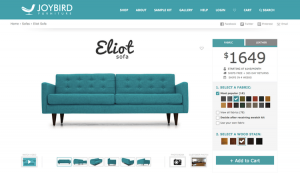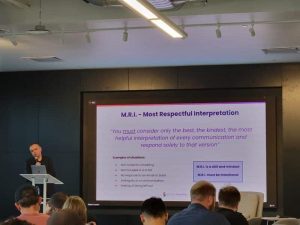The use of hashtags has become so prominent in content, particularly on social media, that it has penetrated pop culture. Jimmy Fallon has produced skits with celebrity guests poking fun at the hashtag phenomenon.
Hashtags are much more than a pop culture trend, though. Understanding how to use them in your marketing and lead generation strategies carries tremendous weight.
However, make sure you are keeping with your company’s Tone of Voice across all of your social media platforms.
Branding and Reinforcement
The term “hashtag” aligns closely with the conventional marketing concept “tagline”. Hashtags, in much the same way as a slogan or tagline, can depict the central theme of a branded advertising campaign.
In some cases, this relationship is straightforward, such as when Intel uses #IntelInside in promotional campaigns. Intel is leveraging its long-running, recognisable slogan.
Often, though, companies introduce innovative content or social campaigns to appeal to a particular audience or to glamourize otherwise dull products.
General Electric has been dubbed the “most exciting boring brand” because it has effectively used awe-inspiring photos and video content to showcase companies using their brands to get the job done.
GE often uses a simple hashtag approach in representing its value, such as #GE #Transportation on it’s Instagram account where it has 271,000 followers.
Social Search Extension
If you value search engine optimisation, you should value hashtags on social channels for the same reasons.
Hashtags are integral to the user search process on leading social media platforms, including Twitter, Instagram and Facebook.
Last year LinkedIn also introduced the use of hashtags to users of their mobile app.
Including targeted hashtags in your social posts is akin to integrating keywords on your web and blog content.
People searching for related topics and phrases are more likely to discover your message.
Additionally, the hashtag conveys to the social channel what your message and profile are about, which simplifies the platform’s ability to recommend your profile to potential followers that have an interest in your broadcasts. Reaching more people is beneficial to your lead generation.
Creating Conversations
Creating or participating in social conversations is another purpose of hashtags.
Brands often use concise, catchy hashtags to strike up a conversation or drive engagement with users.
During the Super Bowl, for instance, the hashtag #SuperBowl was used by brands to attract attention from people paying attention to the big game.
Twitter chats, or scheduled conversations around a particular topic, are another way to use hashtags to start or participate in discussions. Your brand may want to host a chat on a relevant topic, and a clever hashtag keeps users in sync.
When successful, Twitter chats can lead to hashtags becoming trending topics.
There is a very useful series of posts covering this in much greater details on the Twitter Chat page.
Remember that you are engaging with people, so make sure to participate on a personal level. If done correctly, you can boost your brand advocates over time.

Show Personality or Humour
Although some companies place too much emphasis on this factor, hashtags do allow you a way to project personality or humour while remaining professional. Funny, witty or relevant hashtags can enhance the emotional appeal of your content.
A hospitality services company might use #GetYourPicnicOn, for instance, as a way to highlight an outdoor food event that it helps facilitate. This hashtag could be part of an ongoing campaign, or simply a one-off message designed to invoke humour or thought in one message.
Use Your Conversations As Content
If you do decide to run a Twitter chat, use the questions and comments from participants to generate blog posts for your site. It should contain many of the keywords relevant to your industry and will also help with your SEO.
Also, not everyone will be able to make it to your chat, so synopsise the best of it and send it to your email lists to encourage others to join.
Should you manage to get some industry influencers taking part, ask them to share your content once you have it completed.
Wrap Up
There are a lot of benefits to efficient hashtag use in content, social sharing and lead generation strategies.
However, you have to understand their purpose and your intended objectives to maximise results.
Inspire and engage people with your Twitter chats and use the outcomes to create a larger audience for your brand.
Business & Finance Articles on Business 2 Community(84)
Report Post






